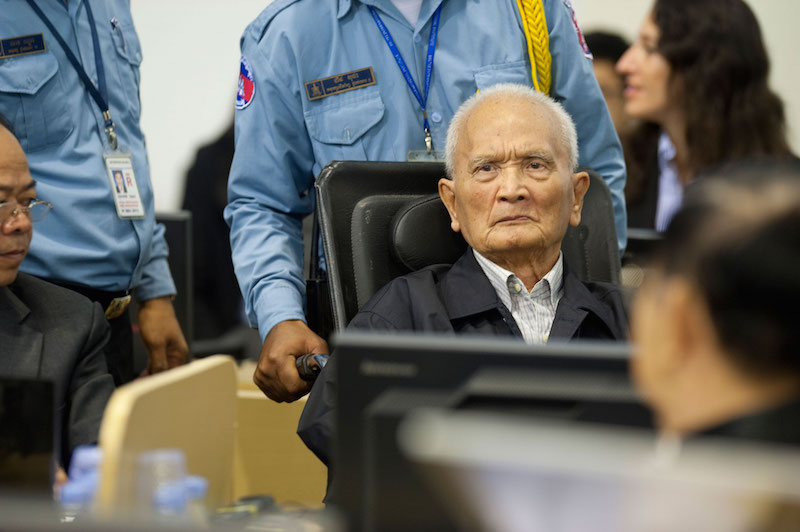Nuon Chea’s defense team took aim at the Khmer Rouge tribunal on Friday for an alleged lack of impartiality, claiming the process had been like fighting a boxing match with “both hands tied behind your back.”
During its first day of closing statements, the defense team for Khmer Rouge’s “Brother Number Two — who is on trial for crimes including genocide alongside its head of state Khieu Samphan — accused the Trial Chamber of perpetuating a reductionist and factually inaccurate version of history it called “the Manichean Narrative.”

While the prosecution should have had to prove its case beyond reasonable doubt, defense counsel Victor Koppe claimed it had been the other way round at the tribunal.
The Dutch lawyer also accused the investigators of being biased against his client.
“Even more unfairly, there were no neutral investigators. The Case 002 investigators were indeed devoted fans of the simplistic, historically incorrect Manichean Narrative,” he said.
“Despite their duty to neutrally search for the truth, they were instructed instead to focus on finding inculpatory evidence only,” he said.
“I have to say, Mr. President, day to day, this is like fighting a boxing match with both hands tied behind your back, and it’s indeed beyond frustrating, but also beyond unfair.”
Defense lawyers then laid out their core arguments relating to the role of Vietnam in covertly backing internal rebellion within factions of the Khmer Rouge.
Rather than a strictly hierarchical regime, the Nuon Chea defense argues that Democratic Kampuchea was wrought with factionalism, with powerful, Vietnamese-backed commanders thwarting the revolution through their traitorous activities.
The arguments have been labeled conspiracy theories by the prosecution and are mostly rejected by prominent Khmer Rouge academics.
After failed coup d’etat attempts — including an alleged 1977 plot to take Pochentong Airport to which witnesses testified in court — the Vietnamese finally took matters into their own hands and waged what Mr. Koppe called a “flagrantly unlawful invasion” to overthrow the regime using Khmer Rouge defectors, including Prime Minister Hun Sen and National Assembly President Heng Samrin.
“Vietnam recruited a band of Cambodians who fled to Vietnam to be their agents. Cambodians who fled to Vietnam were recruited to build up a military ‘liberation front.’ This offered Vietnam’s eventual invasion a propagandistic cloak of legitimacy,” he said.
“After the invasion, Vietnam installed these recruited Cambodians in a puppet government in Phnom Penh loyal to serving Vietnamese interests,” he said.
“As late King Father [Norodom] Sihanouk, in a meeting before the [U.N.] Security Council, called them, ‘Vietnam’s pitiful puppets’ — of course, referring to Heng Samrin.”
The Vietnamese then enacted its goal to spin the historical narrative in its favor, and put sole blame on the “Pol Pot, Ieng Sary clique,” he argued.
“These propaganda efforts painted Vietnam as humanitarian, reasonable and a savior, while at the same time Democratic Kampuchea was the irrational, isolationist aggressor in comparison,” he told the court.
“The seeds were sown for the beginning of the Manichean Narrative.”
The defense is to continue its closing statements on Monday with a focus on the S-21 prison in Phnom Penh from which thousands were sent to their executions.



